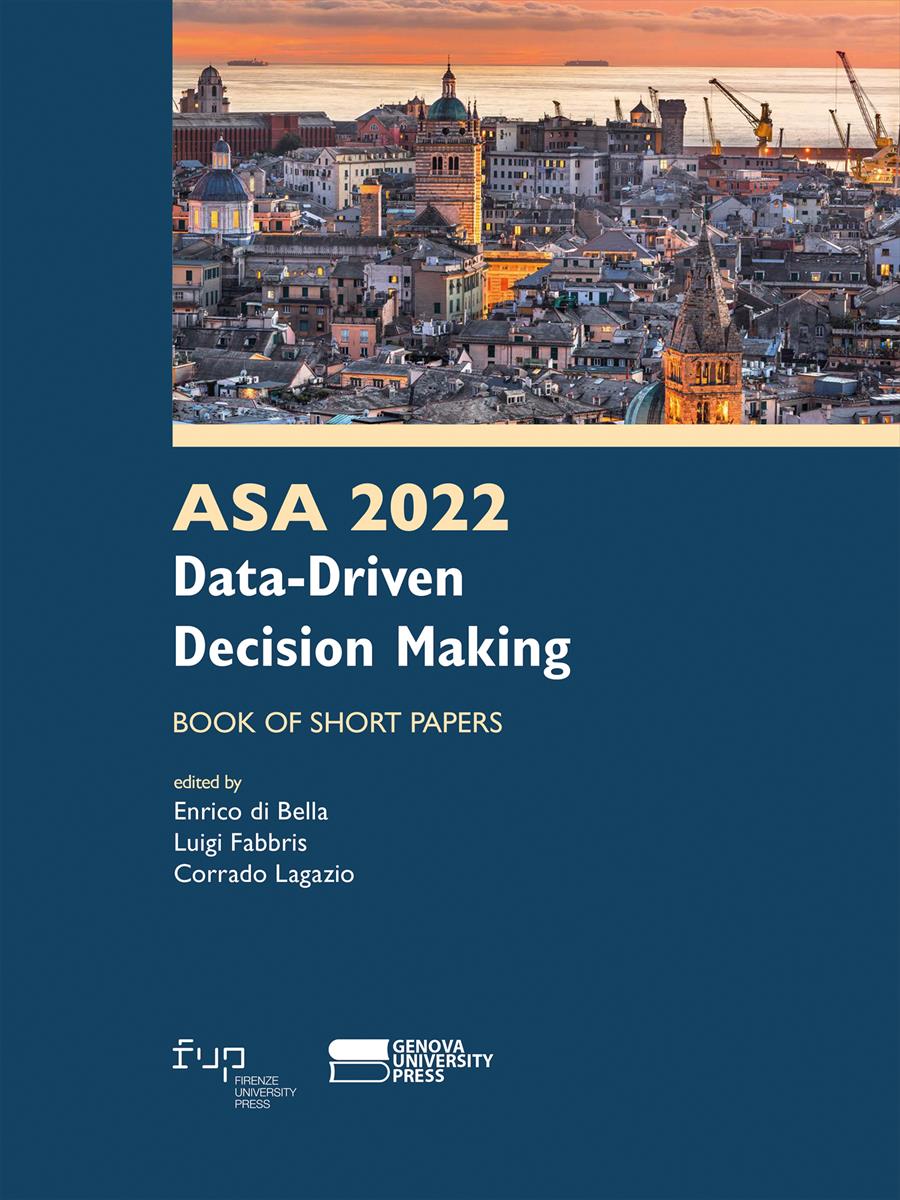- ASA 2022 Data-Driven Decision Making
- Edited by Enrico di Bella, Luigi Fabbris, Corrado Lagazio
Internet use, feeling of unacceptance and Loneliness: immigrants of first and second generation in Italy
- Giovanni Busetta
- Maria Gabriella Campolo
- Antonia Cava
- © 2023 Author(s) |
- CC BY 4.0
- DOI: 10.36253/979-12-215-0106-3.33
Introduction Internet has become an essential part of our everyday life and several goals can be achieved through it. While part of the literature on the topic found a positive correlation between loneliness and the use of the internet, other authors found a negative relationship between loneliness and internet use. Objective The aim of our analysis is to investigate the difference in the use of the Internet between immigrants of first- and second-generation in Italy. Data & Methods Using the Survey on Social Condition and Integration of Foreign Citizens conducted by Istat in 2011-2012, we want to estimate, through a Probit estimation model, the impact of socio-economic characteristics on the regularity of using the Internet. The dependent variable is “Internauta” (Dummy: 1 if subject use internet every day; 0 otherwise). Among the explanatory variables, we included the perception of the subjects about their integration in the social framework and their feeling, such as loneliness, or the perception of unacceptance. Results Our results show that the probability of being an “Internauta” increases being male and living in the North or Centre of Italy. Moreover, both of the feelings (feels alone and not accepted) are negatively correlated to the probability of being an Internet user both for First- and Second-Generation immigrants. Second-generation immigrants are more likely to use the internet everyday than the First-generation ones (the difference in predicted probability is equal to 11%). This probability decreases to 0.59, if the second-generation immigrant feels unaccepted in the city where he/she lives, and to 0.71 if he/she fells alone. Conclusion We can conclude that new possibilities offered by “web sociability” or, in general, by the use of the Internet, is negatively correlated to the immigrants’ dissatisfaction that we identify with the perception of integration and sociability in the offline life (Loneliness and Unacceptance).
- Keywords:
- Internet,
- First and Second generation,
- Immigrant,
- loneliness,
University of Messina, Italy - ORCID: 0000-0001-5843-3851
University of Messina, Italy - ORCID: 0000-0002-1075-4573
University of Messina, Italy - ORCID: 0000-0003-2497-6203
- Al-Kandari, Y.Y., Al-Sejari, M.M. (2020) Social isolation, social support and their relationship with smartphone addiction. Information, Communication & Society. DOI: 10.1080/1369118X.2020.1749698
- Bauer, L.L., Seiffer, B., Deinhart, C., Atrott, B., Sudeck, G., Hautzinger, M., Rösel, I., Wolf, S. (2020). Associations of exercise and social support with mental health during quarantine and social-distancing measures during the COVID-19 pandemic: a cro DOI: 10.1101/2020.07.01.20144105
- Biolcati, R., Mancini, G., Trombini, E. (2017) Brief report: the influence of dissociative experiences and alcohol/drugs dependence on Internet addiction. Mediterranean Journal of Clinical Psychology. DOI: 10.6092/2282-1619/2017.5.1500.
- Brand, M., Wegmann, E., Stark, R., Müller, A., Wölfling, K., Robbins, T.W., Potenza, M.N. (2019). The Interaction of Person-Affect-Cognition-Execution (I-PACE) model for addictive behaviors: update, generalization to addictive behaviors beyond internet- DOI: 10.1016/j.neubiorev.2019.06.032
- Gao, J., Zheng, P., Jia, Y., Chen, H., Mao, Y., Chen, S., ... Dai, J. (2020). Mental health problems and social media exposure during COVID-19 outbreak. PLoS One 15(4), e0231924.
- Kraut, R., Patterson, M., Lundmark, V., Kiesler, S., Mukopadhyay, T., Scherlis, W. (1998). Internet paradox: A social technology that reduces social involvement and psychological well-being?. American Psychologist Journal., 53, pp. 1017-1031.
- Lavin, M., Marvin, K., McLarney, A., Nola, V., Scott, L. (1999). Sensation seeking and collegiate vulnerability to Internet dependence. CyberPsychological Behavior, 2, pp. 425–430.
- Longstreet, P., Brooks, S., Gonzalez, E.S. (2019). Internet addiction: when the positive emotions are not so positive. Technology in Society. DOI: 10.1016/j.techsoc.2018.12.004
- Masaeli, N., Farhadi, H. (2021). Prevalence of Internet-based addictive behaviors during COVID-19 pandemic: a systematic review. Journal of Addictive Disorders. 39(4), pp. 468–488.
- Mattioli, A.V., Sciomer, S., Cocchi, C., Maffei, S., Gallina, S. (2020). Quarantine during COVID-19 outbreak: changes in diet and physical activity increase the risk of cardiovascular disease, Nutrition, Metabolism and Cardiovascular Diseases. 30(9), pp.
- Rumbaut, R. (2004). Ages, life stages, and generational cohorts: Decomposing the immigrant first and second generations in the United States, International Migration Review, 38, pp. 1160–1205.
- Tofallis, C. (2020). Which formula for national happiness?, Socio-Economic Planning Sciences, 70, 100688. DOI: 10.1016/j.seps.2019.02.003
Chapter Information
Chapter Title
Internet use, feeling of unacceptance and Loneliness: immigrants of first and second generation in Italy
Authors
Giovanni Busetta, Maria Gabriella Campolo, Antonia Cava
Language
English
DOI
10.36253/979-12-215-0106-3.33
Peer Reviewed
Publication Year
2023
Copyright Information
© 2023 Author(s)
Content License
Metadata License
Bibliographic Information
Book Title
ASA 2022 Data-Driven Decision Making
Book Subtitle
Book of short papers
Editors
Enrico di Bella, Luigi Fabbris, Corrado Lagazio
Peer Reviewed
Publication Year
2023
Copyright Information
© 2023 Author(s)
Content License
Metadata License
Publisher Name
Firenze University Press, Genova University Press
DOI
10.36253/979-12-215-0106-3
eISBN (pdf)
979-12-215-0106-3
eISBN (xml)
979-12-215-0107-0
Series Title
Proceedings e report
Series ISSN
2704-601X
Series E-ISSN
2704-5846
